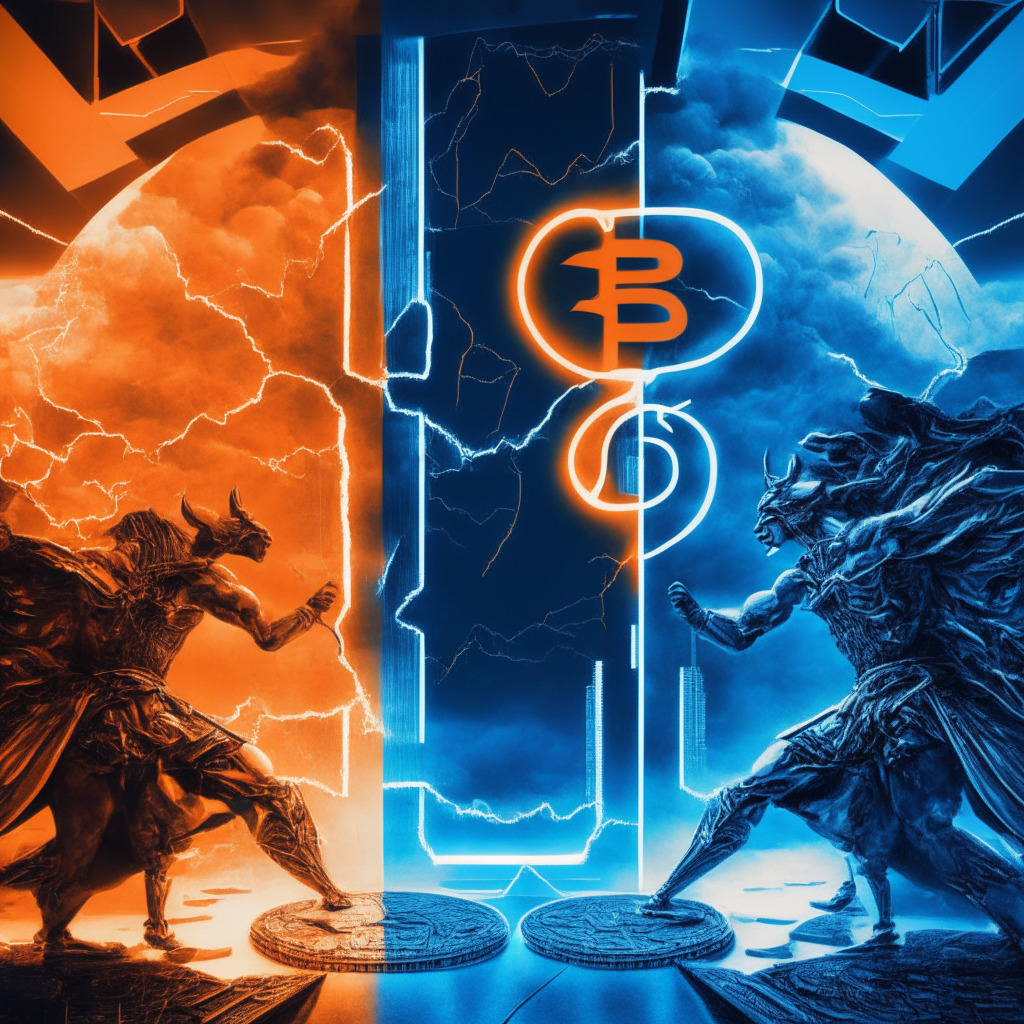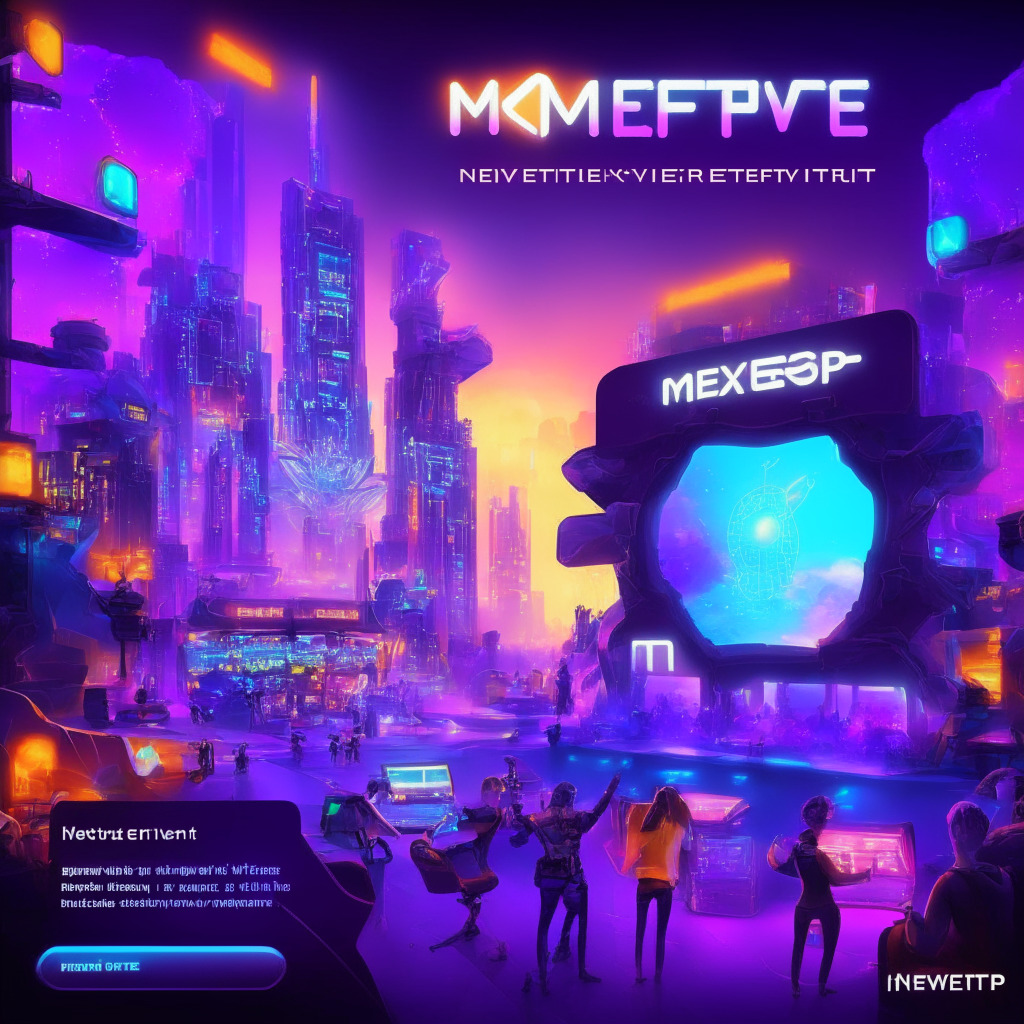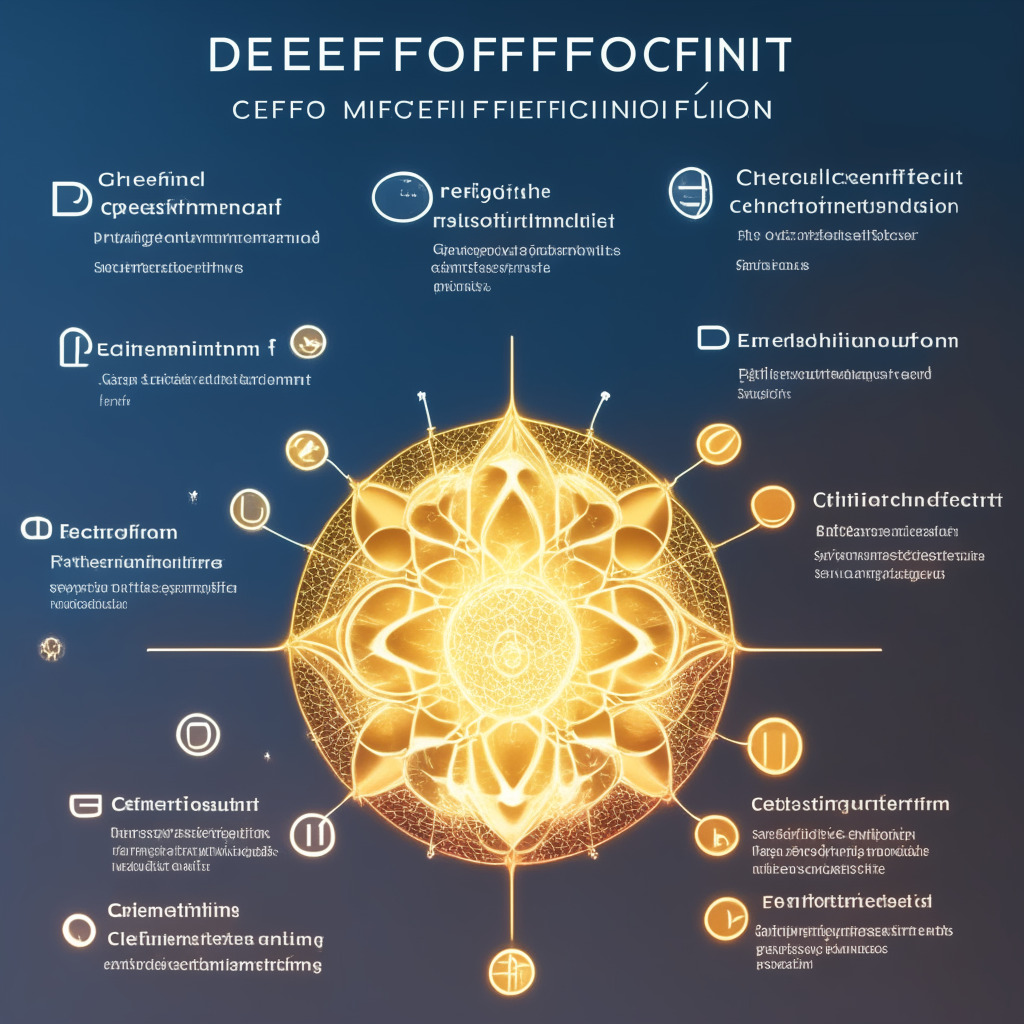Valkyrie’s application for a leveraged bitcoin futures ETF, BTFD, highlights the evolving regulatory landscape for cryptocurrencies. The ETF aims to capitalize on bitcoin futures contracts’ price increases, targeting sophisticated investors. The SEC’s acceptance of some crypto products is promising, but a clearer regulatory framework is needed.
Month: May 2023
All-in-One Metaverse Platform: Launchpad XYZ’s Vision for DeFi, NFTs, Gaming & 10M Web3 Users
Launchpad XYZ aims to create an all-in-one hub for DeFi trading, NFTs, play-to-earn gaming, and the metaverse, offering a user-friendly portal to the decentralized web. The $LPX utility token provides access to benefits and shapes the platform’s direction, emphasizing education and user security.
Boosting Rewards with Origin Ether: The Future of Yield-Farming in a Crowded DeFi Market
Origin Protocol plans to issue Origin Ether (OETH), an ether derivative enabling holders to earn yields by staking ether on other protocols, stacking rewards on top of native staking yields. OETH offers access to DeFi’s highest yields without typical yield-farming hassles and gas fees. However, the crowded staking derivatives market presents challenges for OETH’s growth.
XRP’s Uncertain Future Amid SEC Lawsuit and the Rise of DeeLance: Analyzing Crypto Prospects
XRP’s value declines amidst the ongoing SEC case, casting a shadow on its future. Meanwhile, the utility coin DeeLance gains attention as a blockchain-enabled freelancing platform, tokenizing freelance work into NFTs and offering multiple use cases for its $DLANCE token in the metaverse.
NFT Interest Declines, Yet Big Brands Dive In: Exploring the Growing Use Cases and Challenges
Despite a decline in interest, NFTs continue to attract big brands, with 86 companies initiating NFT/Web3 projects in Q1 2023. This technology presents real-world utility across industries like art, gaming, and retail, offering digital scarcity and fostering authenticity. However, challenges like copyright issues and counterfeiting remain.
Rising Fake Hardware Wallets: How to Safeguard Your Crypto Assets from Deception
Cybersecurity firm Kaspersky warns of fake hardware crypto wallets mimicking major wallet firm Trezor, enabling fraudsters to steal Bitcoin by seizing control of private keys. Kaspersky recommends purchasing wallets directly from official vendors and using official guides to authenticate them, ensuring supply chain security and reducing financial loss risk.
Banking Crisis Fears Boost Crypto Markets: Balancing Innovation and Financial Security
Amid the potential US regional banking crisis, the uncertainty in the banking sector has proven to be bullish for Bitcoin prices. The rise of cryptocurrencies and decentralized finance offers potential solutions to traditional banking challenges during times of economic uncertainty while also prompting concerns and striking a balance between innovation and security.
Collapse of Signature Bank: Crypto Exposure, Regulation, and Lessons for the Future
The collapse of Signature Bank highlights the potential systemic risks posed by crypto-linked banking activities and the importance of stringent regulatory oversight. It serves as a cautionary tale about unchecked growth, inadequate risk management, and the need for proper risk management practices in the volatile and rapidly evolving crypto industry.
Mirandus: The Next Big MMORPG with Crypto Integration, NFTs, and Player-Driven World
Gala Games introduces Mirandus, a medieval fantasy MMORPG combining serene elements, like farming and crafting, with high-risk adventures. Mirandus features extensive crypto elements, including NFTs for characters and in-game assets, requiring a sizable audience for an immersive, player-driven experience.
Balancing Blockchain & NFTs in Gaming: The Pros, Cons, and Search for Equilibrium
In this article, the integration of blockchain and NFTs in gaming is analyzed, discussing potential challenges such as maintaining game balance, decentralization vs. player experience, and in-game economy issues. However, it also highlights the potential advantages like secure ownership and monetization opportunities.
Balancing DeFi and CeFi: Lessons Learned and the Path to Success in Finance
This article explores how the decentralized finance (DeFi) industry can learn from the more established centralized finance (CeFi) sector to offer users a seamless, secure, and trustworthy experience. Key aspects include trust, user experience, standardization, accountability, customer support, strategic scaling, diverse service offerings, and strong cybersecurity measures.
BlockFi Liquidates Amid Debates and Regulatory Shifts: How It Affects Crypto’s Future
Bankrupt crypto lender BlockFi plans to liquidate its platform, citing regulatory developments as a factor. Meanwhile, the SEC dismissed Coinbase’s lawsuit against the agency as “baseless,” and the European Union recently passed Markets in Crypto-Assets (MiCA) legislation, shaping the future European cryptocurrency industry. Legal and regulatory developments continue to impact the crypto industry’s future as the sector evolves.
HackaTron’s New Categories Showcase Expanding Blockchain Ecosystem Potential
Tron’s fourth HackaTron competition highlighted diverse projects and ideas from 625 participants. New categories showcased the expanding innovation potential in blockchain, focusing on Builder and Eco-Friendly initiatives, encouraging recycling, and supporting decentralized applications for trading virtual assets.
Billionaire Paul Tudor Jones Bullish on Bitcoin: Inflation Hedge or Overhyped Risk?
Billionaire hedge fund manager Paul Tudor Jones expresses bullish sentiments towards Bitcoin, discussing its role as an inflation hedge amidst quantitative easing and low interest rates. However, he acknowledges risks like US regulatory pressures and market uncertainties, stressing the ongoing debate around Bitcoin’s long-term value.
Lack of Audits and Independent Boards: Crypto Firms Risking Collapse?
A recent Bloomberg report reveals that numerous influential crypto firms do not work with external auditors and independent boards, raising questions about transparency and professionalism in the cryptocurrency space. This lack of regulation persists despite the high-profile collapse of the FTX exchange and Alameda Research due to poor management and misappropriation of funds.
Crypto Exchanges Face New Era of Regulation: How Compliance Drives Mainstream Adoption
The days of lax crypto regulation are ending, with cryptocurrency exchanges becoming the primary target for regulators. Top-tier crypto exchange Bullish actively embraces compliance standards and adopts blockchain analytics tools, ensuring a safer environment for investors amid increased regulatory scrutiny. Cooperation between regulators, industry players, and crypto firms is key to rebuilding trust in the industry.
The Shrinking Appeal of Bitcoin: Unfriendly US Regulations and Inflation Hedge Debate
American billionaire Paul Tudor Jones highlights Bitcoin’s diminished appeal due to an unfriendly US regulatory landscape and lower inflation expectations. Despite this, Jones still values Bitcoin’s finite supply and keeps a small diversification in his portfolio.
FDIC Blames Crypto for Bank Collapses: Analyzing Risk Factors and Future Implications
The FDIC chair, Martin Gruenberg, attributes non-compliance with risk controls, poor governance, and dependence on uninsured crypto deposits to the collapse of crypto-friendly banks like Signature Bank and Silicon Valley Bank. While cryptocurrencies played a part, sound governance and responsible investments are essential for financial stability.
Ledger’s Controversial Nano X Update: Recover Feature Security Debate
Ledger recently introduced the Ledger Recover feature for its Nano X device, allowing users to encrypt and distribute seed phrases among different custodians. While Ledger claims enhanced security, concerns have been raised regarding ID verification and potential exposure to identity theft. Users must weigh potential benefits against associated risks in this multi-custodian recovery process.
AI Licenses: Striking a Balance Between Innovation and Safety in the Crypto World
OpenAI CEO Sam Altman testifies before U.S. Congress, advocating for AI regulation requiring safety standard compliance and system testing. However, concerns arise over potential over-regulation stifling innovation in the AI and crypto industries.
Crypto Seed Recovery: Ledger Recover vs Social Recovery – A Security Showdown
Ledger introduces a controversial ID-based seed phrase recovery service, raising security concerns due to the potential vulnerability of tying personal documents with crypto seed phrases. Alternative solutions like social recovery, which involve trusted guardians for wallet recovery, may better address the crypto community’s evolving needs without compromising security.
Binance’s Aggressive M&A Strategy and its Impact on Crypto’s Future
Binance aims to expand its customer base and influence through aggressive investments in mergers and acquisitions. Binance Labs focuses on growth and early-stage companies, with a portfolio valued at $9 million and over 200 portfolio companies globally. The firm seeks to enhance lives via Web3 and blockchain technology while also valuing high returns from partnerships.
Crypto Regulation Tug-of-War: US Elections and the SEC’s Shifting Focus on Enforcement
Cryptocurrency prices revived since 2023, but US regulatory scrutiny remains intense, with major players like Coinbase, Binance, and Kraken facing challenges. Crypto influencer Ran Neuner predicts that upcoming US elections could affect regulatory actions and potentially bring changes to the SEC leadership, impacting the crypto market’s future direction.
Enhancing Security with Bitski and Ledger Wallet Integration: Pros, Cons, and Conflicts
Web3 wallet Bitski has integrated with hardware wallet Ledger, enhancing security features and enabling users to securely connect their wallets to decentralized applications (dApps). The partnership supports user-friendly wallet experiences and provides a transaction simulator to help identify potential security risks. Users can switch between Ethereum and Polygon networks to purchase non-fungible tokens across both platforms.
Blockchain Finance: Revolutionary Game-Changer or Passing Fad? Exploring Pros, Cons & Conflicts
The future of finance lies in blockchain technology, offering benefits like increased security, faster transactions, and transparency. However, challenges like scalability, unregulated nature, and potential misuse still exist, leaving the future of this technology uncertain.
Auradine’s $81M Series A Funding: Impact on Blockchain Security, AI & Privacy Debate
Privacy-focused blockchain startup Auradine raised $81 million in Series A funding led by Celesta Capital and Mayfield, with participation from Stanford University and Marathon Digital Holdings. Auradine aims to develop scalable, sustainable, and secure solutions in the fast-evolving blockchain technology sector.
River Raises $35M: A Step Towards Bitcoin-Powered Equitable Economy or Risky Investment?
River raises $35 million in Series B funding, led by Kingsway Capital and supported by billionaire investor Peter Thiel. River offers Bitcoin-related services such as zero-fee dollar-cost averaging, mining, full-reserve custody, and a wallet supporting on-chain and Lightning Network transactions.
Bitcoin-only Companies Thrive Amid Market Downturn: Exploring the Growth and Adoption Trends
Despite the recent downturn in Bitcoin Ordinals, investments in Bitcoin-only companies continue to grow, driven by business and institutional adoption. River, a US-based Bitcoin technology and financial services company, recently secured $35 million in Series B funding, highlighting interest in Lightning Network solutions for low-fee, high-throughput payments.
Centralized vs Decentralized CLOBs: Pros, Cons, and the Future of Trading Financial Instruments
The central limit order book (CLOB) has transformed financial instrument trading, but the rise of decentralized finance (DeFi) platforms raises questions over centralized vs decentralized CLOBs (dCLOBs). While dCLOBs offer a trustless, permissionless environment, centralized CLOBs provide better pricing and faster execution. Technologies like Avalanche subnets improve DeFi, but dCLOBs face challenges like limited functionalities compared to centralized systems.
Crypto Shadow Banks: A Looming Crisis or Future Opportunity? Debating Regulation Pathways
Cryptocurrencies are disrupting the traditional financial sector, with “crypto shadow banks” like FTX, Celsius, and Voyager operating without regulation. As these banks become increasingly interconnected with the real economy, future runs could be potentially destructive. U.S. regulators face the critical decision of protecting these banks or the real economy.
Auradine Secures $81M Series A Funding: AI, Blockchain and Privacy Technologies’ Potential Impact
Auradine, a Silicon Valley-based web infrastructure provider, has raised $81 million in a Series A funding round, aiming to develop hardware, software, energy-efficient silicon, and AI solutions for decentralized applications. Backers include Marathon Digital Holdings, Celesta Capital, and Mayfield.
Bankrupt Celsius Network’s $780M stETH Withdrawal: Liquidation or Reimbursement Plan?
The bankrupt crypto lender Celsius Network withdrew 428,000 staked Ethereum (stETH) valued at $780 million, possibly to liquidate assets for reimbursing customers or creditors. This move coincides with Lido Finance’s introduction of a new withdrawal feature for ETH 2.0 staking.































